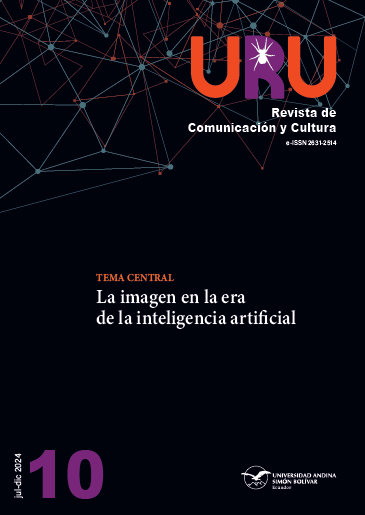Artificial Intelligence: A Matter of Perception
DOI:
https://doi.org/10.32719/26312514.2024.10.5Keywords:
Generative artificial intelligence, image, society, perceptionAbstract
Having Generative Artificial Intelligence at the touch of a button extends the potential of AI to anyone who has a device with an internet connection at their disposal. This democratizes aspects beyond the text, encompassing audiovisual, multimedia, augmented
reality, virtual reality, and more. Artificial intelligence finds fertile ground in the creation of images, contributing to the construction of collective imaginaries and strengthening visual culture and the dissemination of ideas. This expanded capacity for action also raises ethical and emotional uncertainties, with opinions divided between those who see AI as an instrument of deception and manipulation, and more optimistic others who see it as a boost to human progress and creativity. Is it possible to confirm that the
image generation is authentic? Does it generate genuine emotions? Does it transform or affect the perception of space?
Downloads
References
Aguilera, R. 2014. “Carta al director: ¿Revisión sistemática, revisión narrativa o metaanálisis?”. Revista de la Sociedad Española del Dolor 21 (6): 359-60. https://doi.org/10.4321/S1134-80462014000600010. DOI: https://doi.org/10.4321/S1134-80462014000600010
Bender, Emily, Timmit Gebru, Angelina McMillan-Major y Shmargaret Shmitchell. 2021. “On the Dangers of Stochastic Parrots: Can Language Models Be Too Big?”. En FAcct ‘21: Proceedings of the 2021 ACM Conference on Fairness, Accountability, and Transparency, 610-23. Nueva York: Association for Computing Machinery. https://doi.org/10.1145/3442188.3445922 DOI: https://doi.org/10.1145/3442188.3445922
Bishop, J. Mark. 2021. “Artificial Intelligence Is Stupid and Causal Reasoning Will Not Fix It”. Frontiers in Psychology 11. https://doi.org/10.3389/fpsyg.2020.513474. DOI: https://doi.org/10.3389/fpsyg.2020.513474
Bro, Peter, y Filip Wallberg. 2015. “Gatekeeping in a Digital Era: Principles, Practices and Technological Platforms”. Journalism Practice 9 (1): 92-105. https://doi.org/10.1080/17512786.2014.928468. DOI: https://doi.org/10.1080/17512786.2014.928468
Campbell, Colin, Kirk Plangger, Sean Sands, Jan Kietzmann y Kenneth Bates. 2022. “How Deepfakes and Artificial Intelligence Could Reshape the Advertising Industry: The Coming Reality of AI Fakes and Their Potential Impact on Consumer Behavior”. Journal of Advertising Research 62 (3): 241-51. https://doi.org/10.2501/JAR-2022-017. DOI: https://doi.org/10.2501/JAR-2022-017
Cath, Corinne. 2018. “Governing Artificial Intelligence: Ethical, Legal and Technical Opportunities and Challenges”. Philosophical Transactions of the Royal Society A: Mathematical, Physical and Engineering Sciences 376. https://doi.org/10.1098/RSTA.2018.0080. DOI: https://doi.org/10.1098/rsta.2018.0080
Deleuze, Gilles. 1990. “La Società del Controllo”. L’Autre Journal 1. https://tinyurl.com/yc5p2pnu.
Donnarumma, Marco. 2022. “Against the Norm: Othering and Otherness in AI Esthetics”. Journal of Digital Culture & Society 8 (2): 39-66. https://tinyurl.com/mv7b5d7x. DOI: https://doi.org/10.14361/dcs-2022-080205
Douglas, Michael R. 2023. “Large Language Models”. Arxiv. https://doi.org/10.48550/arXiv.2307.05782.
Floridi, Luciano. 2023. “AI as Agency Without Intelligence: On ChatGPT, Large Language Models, and Other Generative Models”. Philosophy and Technology. https://doi.org/10.2139/SSRN.4358789. DOI: https://doi.org/10.2139/ssrn.4358789
Goetschalckx, Lore, Alex Andonian y Johan Wagemans. 2021. “Generative Adversarial Networks Unlock New Methods for Cognitive Science”. Trends in Cognitive Sciences 25 (9): 788-801. https://doi.org/10.1016/j.tics.2021.06.006. DOI: https://doi.org/10.1016/j.tics.2021.06.006
Gozalo, Roberto, y Eduardo Garrido. 2023. “ChatGPT Is Not All You Need: A State of the Art Review of Large Generative AI models”. Arxiv. https://tinyurl.com/3na5ec8v.
Heritage, Stuart. 2023. “Joan Is Awful: Black Mirror Episode Is Every Striking Actor’s Worst Nightmare”. The Guardian. 13 de julio. https://tinyurl.com/kb7wrkzx.
Houde, Stephanie, Vera Liao, Jacquelyn Martino, Michael Muller, David Piorkowski, John Richards, Justin Weisz y Yunfeng Zhang. 2020. “Business (Mis)Use Cases of Generative AI”. Arxiv. https://doi.org/10.48550/arXiv.2003.07679.
Iovine, Anna. 2022. “Tinder Users Are Using ChatGPT to Message Matches”. Mashable. 17 de diciembre. https://tinyurl.com/mrjnj29u.
Landay, Lori. 2008. “Having But Not Holding: Consumerism & Commodification in Second Life”. Journal of Virtual Worlds Research 1 (2). https://tinyurl.com/2jzvz53w. DOI: https://doi.org/10.4101/jvwr.v1i2.355
L?z?roiu, George. 2011. “Conceptualizing Gatekeeping in the Digital Era”. Contemporary Readings in Law and Social Justice 3 (1): 152-9. https://tinyurl.com/55d7zauv.
Lievertz, Matthew. 2019. “Artificial Intelligence in Education”. En Artificial Intelligence and Machine Learning for Business for Non-Engineers, editado por Stephan Jones y Frank Groom, 125-40. Boca Raton, US: CRC Press. https://doi.org/10.1201/9780367821654-11. DOI: https://doi.org/10.1201/9780367821654-11
Liu, Chuncheng. 2022. “Who Supports Expanding Surveillance? Exploring Public Opinion of Chinese Social Credit Systems”. International Sociology 37 (3): 391-412. https://doi.org/10.1177/02685809221084446. DOI: https://doi.org/10.1177/02685809221084446
López, German, y Lauren Jackson. 2023. “A Deal in Hollywood”. The New York Times. 25 de septiembre. https://tinyurl.com/mrdfv6uy.
Manovich, Lev. 2020. L’estetica dell’intelligenza artificiale: Modelli digitali e analitica culturale. Roma: Luca Sossella.
Martínez, M. Mar, y Ana Muñoz. 2015. “Iconografía, estereotipos y manipulación fotográfica de la belleza femenina”. Estudios sobre el Mensaje Periodístico 21 (1): 369-84. https://doi.org/10.5209/rev_ESMP.2015.v21.n1.49100. DOI: https://doi.org/10.5209/rev_ESMP.2015.v21.n1.49100
McLuhan, Marshall, y Bruce Powers. 1989. The Global Village: Transformations in World Life and Media in the 21st Century. Nueva York: Oxford.
Murfianti, Fitri. 2017. “Photo: Identity and Commodity on Social Media Instagram”. En International and Interdisciplinary Conference on Arts Creation and Studies (IICACS 2017), 153-9. Surakarta, ID:ISI Press. https://tinyurl.com/58twd65k.
Radford, Alec, Jeffrey Wu, Rewon Child, David Luan, Dario Amodei y Ilya Sutskever. 2019. “Language Models Are Unsupervised Multitask Learners”. OpenAI Blog 1 (8). https://tinyurl.com/2ywvzycm.
Rajnerowicz, Kazimierz. 2024. “AI or Not: How to Tell if Art Is AI Generated or Real [AI Test]”. Tidio. 22 de mayo. https://tinyurl.com/mur5hfyt.
Roumeliotis, Konstantinos, y Nikolaos Tselikas. 2023. “ChatGPT and Open-AI Models: A Preliminary Review”. Future Internet 15 (6). https://doi.org/10.3390/FI15060192. DOI: https://doi.org/10.3390/fi15060192
Schwartz, Ronald. 1989. “Artificial Intelligence as a Sociological Phenomenon”. The Canadian Journal of Sociology 14 (2): 179-202. https://doi.org/10.2307/3341290. DOI: https://doi.org/10.2307/3341290
Spindler, Gerald. 2019. “Copyright Law and Artificial Intelligence”. IIC International Review of Intellectual Property and Competition Law 50 (9): 1049-51. https://doi.org/10.1007/S40319-019-00879-W. DOI: https://doi.org/10.1007/s40319-019-00879-w
Taecharungroj, Viriya. 2023. “‘What Can ChatGPT Do?’: Analyzing Early Reactions to the Innovative AI Chatbot on Twitter”. Big Data and Cognitive Computing 7 (1). https://doi.org/10.3390/BDCC7010035. DOI: https://doi.org/10.3390/bdcc7010035
Wang, Ge. 2018. Artful Design: Technology in Search of the Sublime. Redwood City, US: Stanford University Press.
Williams, Bruce, y Michael delli Carpini. 2000. “Unchained Reaction: The Collapse of Media Gatekeeping and the Clinton-Lewinsky Scandal”. Journalism 1 (1): 61-85. https://doi.org/10.1177/146488490000100113. DOI: https://doi.org/10.1177/146488490000100113
Wong, Melvin, Yew Soon Ong, Abhishek Gupta, Kavitesh Kumar Bali y Caishun Chen. 2023. “Prompt Evolution for Generative AI: A Classifier-Guided Approach”. Ponencia presentada en la 2023 IEEE Conference on Artificial Intelligence, Santa Clara, Estados Unidos, 5-6 de junio. https://doi.org/10.1109/CAI54212.2023.00105. DOI: https://doi.org/10.1109/CAI54212.2023.00105
Zimmerman, Michael. 2019. Beyond “Humanism”: Heidegger’s Understanding of Technology. Abingdon, UK: Routledge.
Published
How to Cite
Issue
Section
License
Copyright (c) 2024 Uru: Revista de Comunicación y Cultura

This work is licensed under a Creative Commons Attribution-NonCommercial-ShareAlike 4.0 International License.
ASSIGNMENT OF RIGHTS, DECLARATION OF CONFLICT OF INTEREST AND DISSEMINATION
The authors who publish in this journal accept the following conditions:
- Authors retain copyright and grant the journal the right of first publication, with the work registered under the Creative Commons Attribution-NonCommercial-ShareAlike 4.0 License, which allows sharing, adapting and attributing the work (see: Open Access Policies).
- Authors can make other independent and additional contractual agreements for the distribution of the article published in this journal (e.g., include it in an institutional repository or publish it in a book) as long as they expressly indicate that the article was published for the first time in Uru: Revista de Comunicación y Cultura. In the case of reproduction, a note similar to the following must be included: This text was originally published in the journal Uru: Revista de Comunicación y Cultura N ° -, year of publication.
- Authors are encouraged to publish their work on the Internet (e.g. on institutional or personal pages) in the final version published by Uru: Revista de Comunicaicón y Cultura as it may lead to a wider and faster dissemination of the published work.








